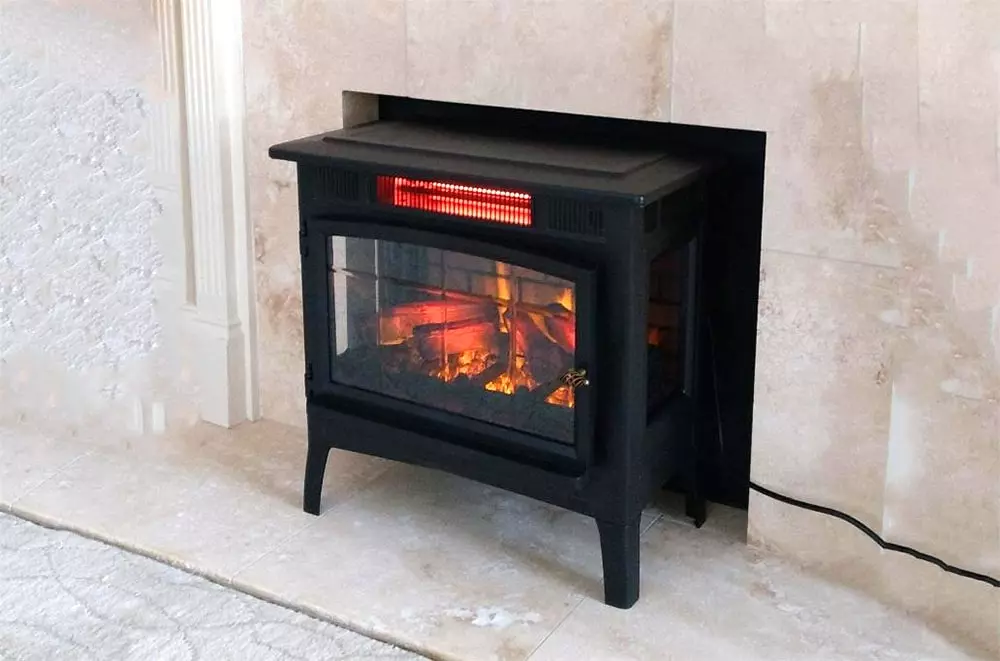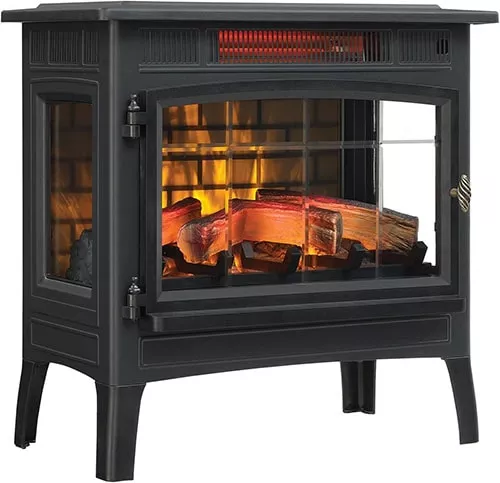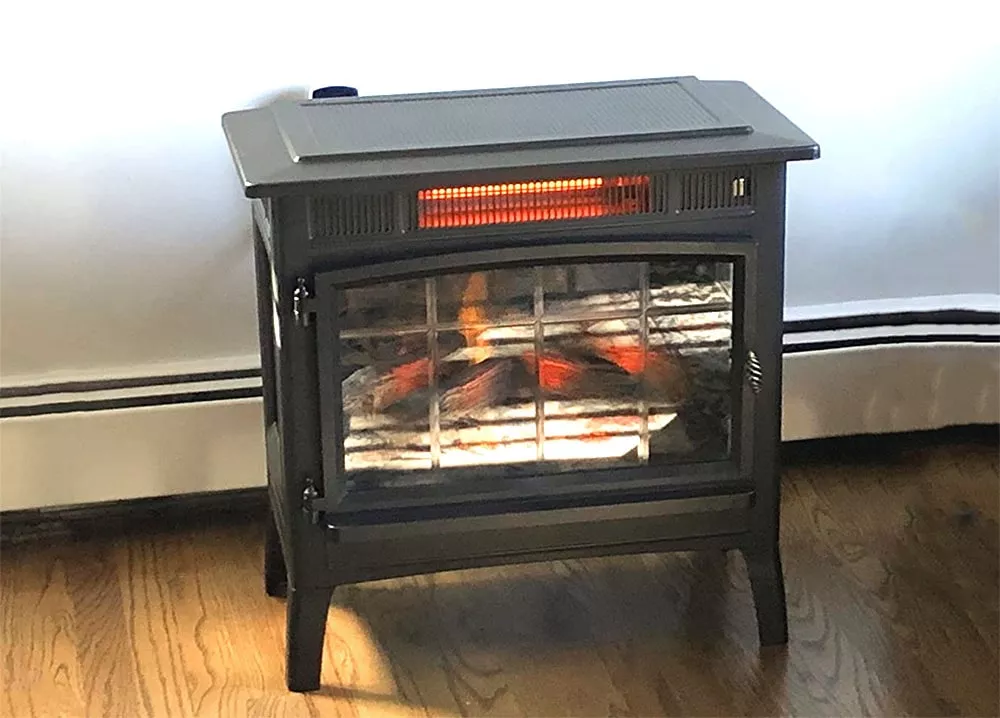Are electric fireplaces energy efficient? The first statement I see when I google for electric fireplace efficiency is that electric fireplaces have 100% efficiency.
Sounds quite good, right?
Not quite…
These statements about efficiencies are always misleading unless you know the physics of electric fireplaces precisely.
In this article, I am going to show you why the 100% efficiency of electric fireplaces is meaningless.
And after tearing these marketing statements down, we’ll find out how truly efficient they are:
Because what really matters is:
How much money do you have to pay for your heat?
How warm do electric fireplaces make you feel?
The 100% efficiency claimed by electric fireplace companies has nothing to do with cost efficiency and how warm you feel. Absolutely zero.
So…
The goal of this guide is to give you a thorough & precise, yet simple understanding of fireplace energy efficiency.
And at the end of this article, I’ll recommend you my favorite affordable & full-metal electric fireplace!
Electric Fireplaces are 100% efficient: What’s the catch?
Electric fireplace companies always state that their fireplaces are 100% efficient. Here’s what that means:
An electric fireplace converts 100% of the input power to heat.
That sounds like a good deal. What’s the catch?
The problem with that statement is that it is a universally true statement about any electric heater, and, if you take it very seriously, any electric device in general.
All input power that any electric device consumes eventually ends up as heat. That’s why computers and smartphones get hot when you use them.
In most electric devices, however, heat is considered waste energy. But in electric heaters, heat is what you want. And since all energy ends as heat, all heaters are 100% efficient.
Any electric heater is 100% efficient. Not just electric fireplaces.
Why is the 100% Efficiency Statement so Prevalent in Electric Fireplaces?
Electric fireplace manufacturers highlight the 100% efficiency of electric fireplaces to compare them with traditional fireplaces, which are never 100% efficient. However, this comparison is misleading!
Traditional fireplaces use either wood or gas as fuel. And here’s the catch:
Traditional fireplaces need to be vented. This means that in a traditional fireplace, heat escapes through the vent.
You can improve the efficiency of a fireplace or wood stove using a fireplace insert. But generally, it’s impossible to accomplish a 100% efficiency.
The hot waste gases from the burning wood need to be vented. Which creates an energy loss.
So, to recap:
In an electric fireplace, efficiency describes how much heat you get for the electric power you input.
In a traditional fireplace, efficiency describes how much heat you get out of your wood minus the heat leaving through the vent.
And, on top of that, the wood in a fireplace never burns ideally. The burn efficiency of wood depends heavily on oxygen supply, the humidity of the wood, and the geometry of a fireplace.
There are many external factors that impact a traditional fireplace’s efficiency.
So, traditional fireplaces are technically inferior to electric fireplaces.
With a traditional fireplace, you get efficiencies of 80%, while with an electric fireplace, you always get 100%.
And, of course, the marketing departments of electric fireplace manufacturers are riding the efficiency wave.
 Electric fireplaces are technically very efficient. But does that efficiency even matter?
Electric fireplaces are technically very efficient. But does that efficiency even matter?
Why Efficiency Does Not Matter
Electric fireplace companies constantly state that their heaters are superior because of their 100% efficiency. But efficiency does not matter.
( Or rather: It does not matter as much as you think it does )
What really matters in a fireplace, regardless of whether it is electric, gas, or wood-based, is how well you can heat your living space with it and how much you have to pay for it.
Let’s have a look:
How well does an electric fireplace heat?
Since electric fireplaces are 100%, it’s pretty easy to tell how well an electric fireplace heats a room.
An electric fireplace outputs 1,500 Watts of heat. That’s about 5,200 BTU/h.
That’s the most common rating for electric fireplaces. The reason is that US-based electric circuits usually can’t handle much more electric power. US wall outlets provide a voltage of 120 Volts and trip at a current of 15 Amps. This corresponds to a power limit of 120V × 15A = 1800 Watts.
That’s why electric fireplaces are limited to 1,500W. If they were any more powerful, you’d risk tripping your home’s electric circuitry.
Comparison: How well does an electric vs. traditional fireplace heat?
Wood-burning fireplaces output between 30,000 BTU/h and 60,000 BTU/h. That’s at least 6 times as much as an electric fireplace.
And that’s one of electric fireplace’s biggest drawbacks. They just don’t get anywhere close to the heat of a real fireplace.
But probably that comparison is unfair. You’re probably not out looking for a real fireplace to heat your entire house in freezing winter.
You just want a nice-looking heat source that can keep the temperature in a living room up. And that’s what electric fireplaces are actually good for.
I just want to make a case against the absurd efficiency claims manufacturers make:
Yes, electric fireplaces are 100% efficient. But at the same time, they output just ~20% of the total heat a wood-burning stove would output.
Electric fireplaces are 100% efficient at only 20% of the capacity.
That’s why the efficiency doesn’t matter. 100% efficiency at 20% heating power is less than 80% efficiency at 100% heating power.
guess my point is pretty clear now.
Cost-Efficiency: Are Electric Fireplaces Cost-Efficient?
Okay, so after reading all of this, you might figure “If electric fireplaces output less heat, and are 100% at outputting less heat, then they must be really cost-effective”.
Unfortunately, this is also not true.
The problem is electricity cost.
While technically electric fireplaces are more efficient than traditional fireplaces, the price you pay for electric power is much higher than the same heating power in wood or gas.
Electric heat costs about 8x as much as the same amount of heat from wood.
And similarly, it is about 3x more expensive than the same amount of heat from gas.
So, if you have the chance, you should always prefer a wood-burning or gas-based heater over an electric heater.
Wood and gas are cheaper than electricity.
And don’t worry: I know, you’re probably out looking for an electric heater, and you have no intention of installing a fireplace or a gas heater.
But this is all to build a claim against misleading marketing statements made by electric fireplace companies.
When Electric Fireplaces are Efficient & Worth It
So far, the narrative of this article was that electric fireplaces output little heat due to power limitations and are costly to run.
But that’s only the case when you compare them to wood or gas-burning fireplaces!
( Which, I’d say, is a fair comparison for heaters mimicking the looks of fireplaces )
When you take an isolated look at electric fireplaces, they can be well worth their money.
Here are 2 cases of efficient use cases of electric fireplaces:
1. Turn down central heating and supply heat with the electric fireplace
Electric fireplaces are just fancy-looking electric space heaters. And space heaters can save you money when you use them correctly.
The idea is to reduce your central heater’s temperature setting by a few degrees. That’s just a slight change, but can save you several hundred dollars in one season depending on your home’s size.
Then, supply heat with the electric fireplace in the rooms you use most, e.g. in the living room.
This results in net savings of up to $160 per year.
I crunched the numbers. Check out the full article: Do Space Heaters save you Money?
2. Heat rooms without a heat source
Heating a room that has no heat source is always worth it. Using a portable electric fireplace is always cheaper than installing a larger heating system.
Especially if you live in a rental apartment, an electric fireplace can provide the warmth you need and the comfort of a real fireplace without having to agree anything with your landlord.
So, are electric fireplaces worth it?
Yes, an electric fireplace is worth it and an efficient means to heat if you don’t want to or can’t install a domestic heating system. Also, they can save money if you turn down central heat.
As you see, the efficiency of an electric fireplace does not really depend on electricity and technology. Rather, it’s all about efficient usage.
Recommended Electric Fireplace
As you know now, electric fireplaces can be efficient worth it! It solely depends on how you use them.
My favorite electric fireplace is this Duraflame Fireplace (click here to view it on amazon).
 My recommendation: This Duraflame fireplace. It just works. A great product.
My recommendation: This Duraflame fireplace. It just works. A great product.
I recommend this particular fireplace over others, because it’s full metal!
Practically, it’s impossible to break!
And, if you know me, I love quality products that you buy once and never have to worry about again.
And of course, the Duraflame fireplace outputs enough heat to keep a regular living room warm in winter!
If you turn down central heat and use the fireplace as a supply heater, it can save you money.
And… it’s of course 100% efficient.(wink)
Conclusion
Electric fireplaces are energy efficient if you use them properly. Ideally, you run them only as supply heaters. As primary heat sources, they are only viable if you don’t have a central heating system!
In that case, gas or wood-burning heaters would be better.
Overall, electric fireplaces are perfect for everybody looking to get the typical comfort of a real fireplace, but without all the installation work and without the high initial expense of a real fireplace!
In principle, it does not really matter which electric fireplace you pick. I recommend you the Duraflame fireplace (linked earlier), because its sturdy, reliable, and will probably last you for many years!
Have fun heating!
